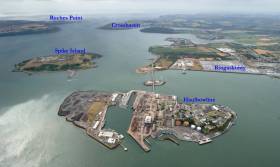Displaying items by tag: Coast Guard helicopter
“The boy stood on the burning deck,” is one of the most famous lines in literature and particularly relevant in the maritime sphere. Many people can quote the next line…”Whence all but he had fled…” But why was he there, on what ship and in what circumstances? On this week’s edition of THIS ISLAND NATION we tell you the full story. While listening to it, I compared it with a following story on the programme, the threat to the operations of the Irish Naval Service by a commercial company.
It seems ludicrous that a fully operational Naval Service is under threat, but so it is and the warning has come from the Department of Defence, so it is the opinion of Government.
“This cannot be an acceptable situation….for the necessary functioning of a fully operational Naval Base…..” Those words, from the Department of Defence, are blunt and were made in a major intervention at a public inquiry held by Bord Pleanala into the Indaver Ireland waste company’s third attempt to build a hazardous waste incinerator at Ringaskiddy in Cork Harbour, close to Naval Base headquarters. The Department went further, stating that the location of the incinerator would also affect Air Corps operations, which “may be forced to impose a ‘no-fly’ restriction” around Haulbowline Island. “In addition, Haulbowline Island is accessed by road as a sort of cul de sac to the Ringaskiddy Road. The proposed incinerator is to be built adjacent to this road, before Haulbowline. Therefore, in the event of any accident at the incinerator, road access to and from Haulbowline is threatened. For example, if an accident at the incinerator necessitated local area evacuation, the evacuation of Haulbowline would be denied.
“This cannot be an acceptable situation for those that work at or visit Haulbowline, nor for the necessary functioning of a fully operational Naval Base therein.”
That makes the threat to the Naval Service very clear. No nation can accept a restriction imposed on its Naval Service operations. That must be national policy. I am proud of our Naval Service. It is a professional, top-level maritime organisation. Its rescue work in Irish waters has been superb. Its performance on refugee rescue in the Mediterranean has raised the profile of Ireland as a maritime nation. I do not accept that its operations should be threatened. I live in the Cork Harbour area. Through my kitchen window I see three wind turbines and several chemical factories. So harbour industrial development is an accepted part of my daily life, but a threat to our Naval Service is not acceptable.
Also under threat, publicly stated by the Minister for the Marine, is €500m. of marine development investment in the harbour if the incinerator, which he has described as “wrong place, wrong time,” is built. Concern has been voiced about youth sailing close to the incinerator and, if Air Corps helicopter operations are affected, what about the effect on Coast Guard helicopter operations in the area?
This is the 50th edition of THIS ISLAND NATION so a somewhat unusual coincidence of two Naval stories on the programme - that of the legendary boy who stood on the burning deck of the flagship of Napoleon’s fleet at the Battle of the Nile, the three-decked, 120-gun L’Orient and the threat to Ireland’s Naval Service
• Listen to the programme below:






























































